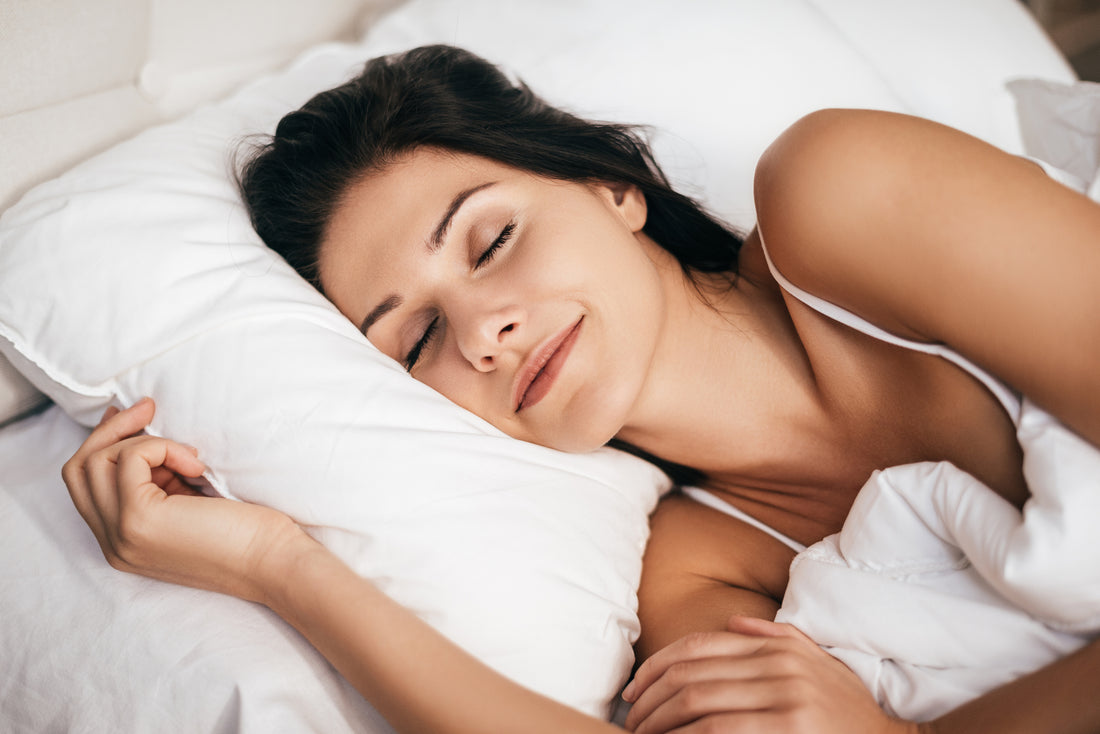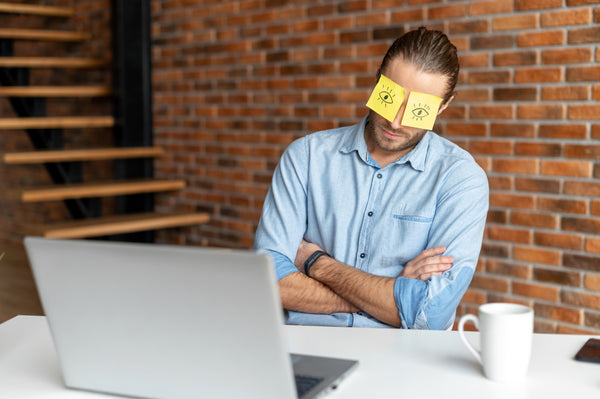How to Sleep Earlier: Top Tips For Going to Bed

Modern life is hectic. We must balance our jobs, work life and an interconnected world. Getting the right amount of rest can be challenging, and you may wonder how to get the recommended amount of sleep and how to sleep earlier.
However, knowing how to go to bed early may not seems as impossible as it first sounds. There are many tips and tricks you can use to make it happen. Plus, numerous health benefits exist once you know how to sleep early, such as increased energy and improved alertness. All gained simply by going to bed earlier and getting to sleep early.
In this article, we'll look at some of the reasons you might not go to sleep early. Then, the health effects of not sleeping correctly before showing you some of our top tips on how to go to sleep earlier. Once done, you'll know everything you need on how to sleep early and get the best sleep of your life in no time! Let's jump in!
10 Reasons You Might Not Be Going To Bed Early

The first step to being able to go to bed early is understanding why you might not be going to bed early in the first place. There are a variety of reasons that people have difficulty sleeping or don't get enough sleep. Here are some of the most common:
You're working long hours and feeling overwhelmed: In our fast-paced world, it's not uncommon to feel like you're constantly playing catch up. If you're working long hours, it can be tough to find the time to relax and wind down before bed. This feeling of being overwhelmed can make it difficult to fall asleep.
You have young children who keep you up at night: If you have young children, they likely keep you up at night. It can be tough to get a good night's sleep when you have young kids, whether it's because they're sick, teething or want to play.
You're dealing with stress or anxiety: Stress and anxiety can be significant sleep disruptors. If you're worrying about things that have happened during the day or stressing about upcoming events, it can be tough to fall asleep.
You're using electronic devices before bed: Using electronic devices such as laptops, smartphones and tablets before bed can make it harder to fall asleep. The blue light emitted from these devices can interfere with your body's natural sleep-wake cycle and make it tougher to drift off to sleep.
You're not getting enough exercise: Exercise is crucial for overall health. Did you know that it can also help you sleep better? Getting regular exercise helps to regulate your body's natural sleep rhythm.
You're eating late at night: Eating a big meal right before bed can make it difficult to fall asleep. Your body is working hard to digest the food, which can keep you awake.
You drink caffeine late in the day or evening: Caffeine is a stimulant that can make it harder to fall asleep. If you're drinking caffeinated beverages late in the day or evening, it can interfere with your sleep.
You smoke cigarettes: Cigarette smoking is bad for your health and can make it tougher to fall asleep. The nicotine in cigarettes is a stimulant that can make it harder to drift off.
You're trying to sleep in a noisy environment: If you live in a city or are trying to sleep in a noisy environment, it can be challenging to get the peace that you need to fall asleep.
You're not following a regular sleep schedule: It's important to have a regular sleep schedule. This means going to bed and waking up at the same time each day, even on weekends. If you don't follow a regular sleep schedule, it can be tough to get enough sleep.
You may also identify more serious issues when considering how to sleep early. These include sleep apnea, insomnia, inertia, and other medical conditions. If you're having difficulty sleeping, you must talk to your doctor to rule out any underlying medical conditions.
Why You Should Sleep Early: The Risk Health Benefits of Sleep

Now that we've looked at some of the reasons you might not be going to bed early let's look at the effects of not getting enough sleep. There are a variety of health risks associated with not getting enough sleep, some with short-term effects and some with long-term effects.
Short-term effects of not getting enough sleep include:
- Feeling tired during the day
- Difficulty concentrating
- Irritability
- Increased appetite
- Weight gain
Long-term effects of not getting enough sleep include:
- High blood pressure
- Diabetes
- Heart disease
- Stroke
- Memory loss
- Depression
As you can see, there are a variety of risks associated with not getting enough sleep—these range from being tired during the day to long-term health problems such as stroke and heart disease.
How To Go to Sleep Earlier: 10 Tips

If you're looking for ways to go to sleep earlier, there are a variety of things you can do. Below are ten tips backed by science that can help you get the restful sleep you need.
1. Establish a Regular Sleep Schedule
Going to bed and waking up simultaneously each day can help regulate your body's natural sleep rhythm, which is vital when looking at how to sleep early. Having a regular sleep schedule is one of the most important things you can do to get enough sleep.
However, as we highlighted earlier, this can be easier said than done when your hectic lifestyle gets in the way. Ensuring you take a disciplined approach to your sleep schedule is key to success. Make sure your children have strict bedtimes some while before your own, keep your devices switched off and avoid bringing work home with you.
Establishing a rigid routine is crucial when learning to go to bed early.
2. Get Some Exercise
As also mentioned above, exercise is good for physical health and improves sleep. Regular exercise can help you fall asleep more quickly, improve the quality of your sleep and be a crucial part of how to sleep early.
However, it's important to note that exercise can have the opposite effect if done too close to bedtime. Exercise can make it harder to fall asleep if done in the evening or close to bedtime. It's best to exercise in the morning or afternoon if you're looking to improve your sleep.
3. Limit Caffeine Intake
Many people thinking about how to go to sleep earlier might think about caffeine. Limiting your caffeine intake or avoiding it altogether is best if you're having trouble sleeping. It's important to note that caffeine isn't just found in coffee. It's also found in tea, soda, chocolate, and energy drinks.
While eliminating caffeine, particularly close to going to bed, is great as a solution for how to sleep earlier, it's also got numerous other health benefits. Eliminating caffeine can also improve your mood, reduce anxiety and improve focus.
4. Avoid Alcohol Before Going to Bed
You may have overlooked alcohol when wondering how to go to sleep earlier. Many enjoy a glass of alcohol with their dinner or something before bed. Others may have been out for the evening. In any case, alcohol can be detrimental for those looking to go to sleep early.
The effects of alcohol on sleep are twofold. Firstly, it can make you drowsy and make it easier to fall asleep. However, once the effects of alcohol have worn off, it can disrupt your sleep and make it harder to stay asleep. This is because alcohol causes your body to go through withdrawal when its effects have worn off.
5. Limit Exposure To Blue Light
As highlighted, blue light can hurt your sleep if you plan to go to bed early. This is because blue light suppresses the production of melatonin, the hormone that makes you feel sleepy. In addition, blue light also increases your alertness and makes it harder to fall asleep.
You can do a few things to limit your exposure to blue light. The first is to avoid using electronic devices such as phones, laptops, and tablets for at least an hour before going to bed. If you must use these devices, consider using blue light-blocking glasses.
6. Avoid Working Late at Night
Bringing your work home with you is an age-old problem for those trying to go to sleep early. Not only this, but in our modern era, many bosses expect workers to always be "on call" and answer emails long after their work hours have ended. This can stop you from going to bed early and disrupt your natural sleep rhythm. It can also add to stress levels.
The best solution is to try and avoid working late at night. If this isn't possible, take breaks every few hours to walk around or do something else outside of work. This will help you avoid getting too stressed or anxious and make it easier to go to bed when you finally clock off.
7. Reduce Stress
Talking about stress more generally, it can be a problem for those trying to go to sleep early. Stress can make it difficult to fall asleep and lead to lighter, less restful sleep. If you're having trouble sleeping, finding ways to reduce stress in your life is crucial.
We've already mentioned some things you can do, and you may wish to consider things such as meditation, yoga or reading before bed. These activities can help you relax and reduce stress levels, making it easier to go to sleep when you want to.
8. Make Sure Your Sleeping Environment Is Comfortable
If you're still struggling and wondering how to go to bed early, your sleep environment might be an issue to look at. This is because a comfortable and relaxing sleeping environment can make it much easier to fall asleep.
There are a few things you can do to improve your sleep environment.
One is to make sure your bed is comfortable. This means having a mattress and pillow that offer the proper support and are at the correct firmness for you. It's also vital to have breathable sheets that won't make you too hot or cold during the night.
Another thing to consider is the noise and light levels in your bedroom. Too much noise or light can make it harder to go to sleep early, so try to create a dark and quiet space. This might mean using blackout curtains or an eye mask to block light.
9. Avoid Napping
We all enjoy a good nap, but it can be an issue when looking at how to sleep earlier for your regular bedtime. This is because napping during the day can make it harder to fall asleep at night. This is especially true if you nap close to bedtime.
If you plan on going to bed early, try and avoid napping during the day or at least limit your naps to 30 minutes or less. It's also best to nap earlier in the day rather than close to when you want to sleep.
10. Wake Up Earlier
One of the most obvious answers for those asking how to go to bed early is simply waking up earlier. This might not sound appealing, but it can help reset your body's natural sleep rhythm.
If you wake up early and start your day earlier, you'll be more tired by bedtime. This can make it much easier to go to sleep when you want to. It might take a bit of getting used to, but once you do, it can be an effective way to improve your sleep schedule.
However, for some people going to bed early isn't so much the problem. Instead, they have issues waking up. In that case, read on!
You've Learned How to Sleep Early but Can't Wake Up Properly. Now What?
You've learned how to go to sleep earlier; that's great! But knowing how to go to sleep earlier is only 50% of the potential issue, with many people forgetting that waking up correctly is just as important.
If you're finding it hard to wake up in the morning, one issue might be sleep debt. This is the difference between the amount of sleep you need and the amount of sleep you get. This can make it very hard to wake up feeling rested and refreshed.
Equally, more severe issues, such as sleep inertia, may be at play. This is when you feel groggy and disoriented after waking up, which can be caused by sleep deprivation or specific sleep disorders. If you're regularly struggling to wake up feeling rested, it's best to speak to a doctor to rule out any underlying issues.
How Natural Sleep Aids Can Help You Go to Sleep Early and Wake Up Refreshed

There are many ways to improve your sleep, but sometimes it's not enough. This is where natural sleep aids can come in handy. Herbal teas, supplements, and essential oils can all help you get a good night's sleep and wake up feeling refreshed.
Consider valerian root, chamomile tea or lavender oil. Other good options include bergamot, cedarwood, and vetiver.
However, if you're looking for something to help you wake up gradually and effortlessly, you'll want a clinically proven mixture of all-natural ingredients.
B・SYNC ON is the only supplement on the market that aids and improves your wake-up process. Vitamins B5, B12, Zinc, and Caffeine are stored in a delayed-release capsule so you can take it before bedtime. The nutrients won't be released until seven hours later when you've slept a whole night. You'll wake up gradually feeling refreshed and energized for the day ahead.
To learn more about B・SYNC ON, check out the rest of our website!
How To Go To Bed Early: Conclusion
If you're wondering how to sleep earlier, the answer is more straightforward than you might think. There are many solutions, from going to bed early to using natural sleep aids. The key is to find your issue and what works best for you and stick to it. With a bit of effort, you'll sleep better in no time.
FAQs
What is the number one tip to ensure you can go to sleep early?
The best way to go to sleep early is to have a set bedtime that you stick to every night. This will train your body to know when it's time to sleep and make it easier to fall asleep when you get into bed.
What are some natural sleep aids that can help you sleep early?
Some popular natural sleep aids include valerian root, chamomile tea, and lavender oil. Many can be drunk in tea.
I know how to go to bed early, but I need help waking up. What can I do?
Many products on the market can help you sleep, but B・SYNC ON is the first to help you wake up and feel refreshed. Our supplement uses a clinically proven mixture of all-natural ingredients to improve your wake-up process.







